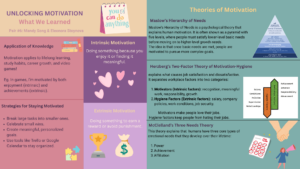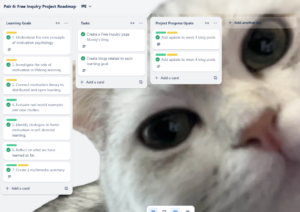
Infographic made by Mandy
Throughout the course of our Free Inquiry Project, we have dived into various aspects of the psychology behind motivation. We began by doing an overview of the topic, building our understanding of intrinsic and extrinsic motivation and looking at some theories of motivation. We then began to apply our knowledge of motivation to various concepts, specifically lifelong learning and open and distributed learning. To solidify our understanding of the subject, we explored a few real-life examples of motivation in the educational space and amassed a few strategies for fostering motivation in self-directed learning.
We also completed everything we set out to do on our Trello board:

Eleonora:
I am very proud of the detailed dive we did into a topic that we had never learned about before. Understanding the theory behind motivation puts a lot of my own learning journey into perspective therefore I really appreciate the insights I gained from this project on a personal level. This was also my first time working on an assignment focusing on multimedia information sharing which I greatly enjoyed. There are many great resources to be found on motivation, especially a wonderful variety of Ted Talks!
Mandy:
In a previous course, we got to learn about what extrinsic and intrinsic motivation was. I remember being interested in learning more, but I (ironically) didn’t have the drive to seek out more information on my own time. This project gave me the chance to tap back into a topic I was interested in and delve deeper into it. I definitely feel that I learned a lot about myself through this project, as the topic is highly relevant to our personal lives. Much like what was suggested in one of our pages, I am glad that Sonja gave us the chance to choose a topic, and that freedom of choice made me feel intrinsically motivated to learn and reflect. I had several takeaways from this project:
- Balancing intrinsic and extrinsic motivation is the best form of motivation.
- Understanding the core concepts of motivation psychology and how easily I can apply it to my personal life. For example, I can understand why in video games I am fueled by intrinsic and extrinsic motivation, which makes me want to learn different ways to enjoy the game even more AND to complete achievements.
- Knowing what the different strategies for staying motivated are. After realizing how much cognitive workload I can reduce and how much motivation I can gain by taking 15 minutes to break large tasks into smaller tasks, it makes me feel that I can have a genuine interest to improve my learning journey (academically as well as my future career).